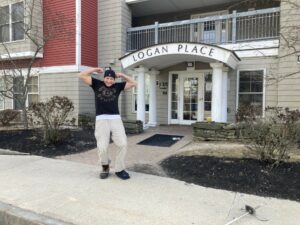Although we don't have a vaccine for mental health or substance use disorders, we do have practical and effective solutions. They are the effective and evidence-based practices we know work — access to treatment, harm reduction services, mental health support, peer support groups, and perhaps most importantly, educating our community to reduce stigma and promote compassion.
Andrew Bove, Preble Street Vice President of Social Work
Access to healthcare, especially mental health care and substance use treatment, is difficult for many people in our community, especially people who are unhoused. Living in high-stress situations on the streets or in crowded shelters with limited access to treatment makes people experiencing homelessness particularly vulnerable to chronic mental health issues and co-occurring substance use disorders.
Across all of our programs, Preble Street serves some of the most vulnerable Mainers, people with complex mental and behavioral health needs. People who have experienced chronic homelessness and who have a mental health and/or substance abuse disorder require trauma-informed care and treatment as they work towards their goals. But, this treatment is often difficult to access because of the many barriers to access and an overall dysfunctional mental healthcare system.
Mental health and homelessness are interconnected, and this May, during Mental Health Awareness Month, take a few minutes to learn more about the relationship between mental health and homelessness and what Maine can do to impact the mental health care crisis it is experiencing.
While people experiencing homelessness report higher rates of serious mental illness (e.g. schizophrenia, bipolar disorder, etc.) than the general public, the number of people who report a serious mental illness are still only part of the overall number of people experiencing homelessness.
People lose housing for many reasons – economic reasons, death of a family member, domestic violence, end of relationship, etc. – and research shows that increases in homelessness are not strongly connected with the number of individuals who have mental illnesses or substance abuse disorders. In fact, mental or behavioral health disorders and substance abuse are many times outcomes of experiencing homelessness. The stress and trauma of homelessness makes it a known risk factor for creating the conditions for mental illness and substance abuse disorders (3), and people who experience chronic homelessness have a far higher risk of mental illness, disability, or a substance abuse disorder.
On a single night in the U.S. in January 2023...
Click here for the full 2023 US PIT count.
*Chronic homelessness describes someone who has experienced homelessness for at least a year — or repeatedly — while struggling with a disabling condition, like a serious mental illness, substance use disorder, or physical disability.
The best predictor we have for homelessness is a lack of affordable housing in an area (4). High rent prices and low vacancy rates are shown to increase homelessness, while mental illness and substance abuse do not have a demonstrated connection to increases in homelessness rates (5). Survey data from the last 10 years also supports this. When asked, people say economic reasons are the cause for losing their housing – job loss, eviction, rent increase, money challenges, etc. – not mental illness (6-7).
What are the solutions?
For there to be any real “solution” to homelessness, we must focus on prevention and fixing the broken systems of care that exist in our society. Social and economic factors, like adverse childhood experiences, lacking mental health services, racial inequities, economic inequality, the rise of housing costs, etc., all contribute to rising rates of homelessness, especially among people with mental illness, and must be addressed with joint policy and advocacy efforts.
Maine’s critically important low-barrier shelters recently received three years of $2.5M in annual funding — a total of $7.5M — in the 2024 supplemental budget signed by Governor Janet Mills. These shelters fill a critical gap in meeting the needs of people with complex medical needs, histories of trauma, and untreated substance use and mental health disorders.
There is no one-size-fits-all housing solution for people experiencing homelessness, but Site-based Housing First, which prioritizes access to permanent, long-term housing, has proven effective for people with complex needs who have experienced chronic homelessness. Preble Street’s three Site-based Housing-First programs, Logan Place, Florence House, and Huston Commons all demonstrate the effectiveness of this model in stably housing people with complex needs.
When people are provided a safe, healing environment, support from a compassionate and professional social worker, and low-barrier access to mental health treatment hope and opportunity arise. To save more lives, Maine — and the rest of the U.S. — must continue to invest in a trauma-informed, dignified shelter system and Site-based Housing First alongside large-scale changes in how we care for people suffering from mental illness.
1. U.S. Department of Housing and Urban Development (2023). Part 1 – Point in Time Estimates of Homelessness. Abt Associates.
2. MaineHousing (2023). 2023 Point in Time Count. Maine State Housing Authority.
3. Goodman, Lisa A, Leonard Saxe, and Mary Harvey (1991). Homelessness as psychological trauma. American Psychologist, 46(11): 1219–1225.
Corcoran, C., Walker, E., Huot, R., Mittal, V., Tessner, K., Kestler, L., & Malaspina, D. (2003). The stress cascade and schizophrenia: Etiology and onset. Schizophrenia Bulletin, 29(4): 671–692.
Castellow, Jennifer, Bret Kloos, and Greg Townley (2015). Previous homelessness as a risk factor for recovery from serious mental illnesses. Community Mental Health Journal, 51: 674-684.
4. Shinn, Marybeth, Jim Baumohl, and Kim Hopper (2001). The prevention of homelessness revisited. Analyses of Social Issues and Public Policy, 1.1: 95-127.
Shinn, Marybeth (2009). Ending Homelessness for Families: The Evidence for Affordable Housing. Washington, DC: National Alliance to End Homelessness and Enterprise Community Partners.
Colburn, G., & Aldern, C. P. Homelessness is a housing problem: How structural factors explain US patterns. Univ of California Press, 2022.
National Coalition for the Homeless (June 2007). Why Are People Homeless? National Coalition for the Homeless.
5. All Home & Applied Survey Research (2019). Count Us In: Seattle/King County Point-In-Time Count of Persons Experiencing Homelessness.
6. Snow, David A. and Rachel E. Goldberg (June 2017). Homelessness In Orange County: The Costs to Our Community.
7. Applied Survey Research (2022). 2022 Alameda County Homeless Count And Survey Comprehensive Report.
Read more

KeyBank Foundation supports expansion of Preble Street’s Site-Based Housing First programs in Maine
Preble Street, which has offices in Bangor, Lewiston, and Portland, ME. has received a three-year, $300,000 grant commitment from KeyBank Foundation to support Preble Street’s Site-Based Housing First (SBHF) programs. The funds will help them support the State of Maine’s plan to functionally end chronic homelessness for our community’s most vulnerable members through the creation

A whole new chance at life
For 14 years, Kabir was homeless in Portland. But today, he is safely housed at Logan Place, Maine’s first Site-based Housing First program which opened 19 years ago. Kabir’s time on the streets was tough. “There is no break when you’re homeless. There’s no door to close,” he shared. Living outside led to numerous health

Mental health and homelessness: get to know the facts
Although we don’t have a vaccine for mental health or substance use disorders, we do have practical and effective solutions. They are the effective and evidence-based practices we know work — access to treatment, harm reduction services, mental health support, peer support groups, and perhaps most importantly, educating our community to reduce stigma and promote

Celebrating advocacy wins
Low-barrier shelters receive funding for the next three years… On April 22, 2024, Governor Janet Mills signed the supplemental budget into law, which includes three years of $2.5M in annual funding — a total of $7.5M — to directly support emergency low-barrier shelters. This funding will be incredibly impactful for Maine’s five privately operated, low-barrier

19 years of Site-based Housing First at Logan Place
“For me, eventually, is a key word. It’s my first apartment in 14 years,” shares Kabir. Kabir is the newest resident of Logan Place, Maine’s first Site-based Housing First building, which opened 19 years ago this month. Logan Place has 30 efficiency apartments, with 24-hour on-site support for adults who have experienced chronic homelessness. Kabir

Avesta Housing & Preble Street Announce New Site-based Housing First Partnership in Portland
Avesta Housing, the largest nonprofit affordable housing provider in northern New England, and Preble Street, a nonprofit social work agency serving the most vulnerable people in Maine, have announced plans to provide Site-based Housing First permanent housing with on-site support services to chronically homeless people on the site of the former Oxford Street homeless shelter

